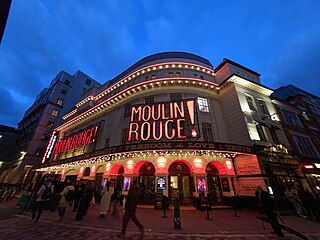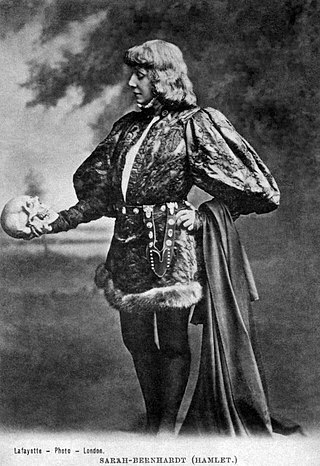
Oscar Greeley Clendenning Hammerstein II was an American lyricist, librettist, theatrical producer, and director in musical theater for nearly 40 years. He won eight Tony Awards and two Academy Awards for Best Original Song. Many of his songs are standard repertoire for vocalists and jazz musicians. He co-wrote 850 songs.

The Importance of Being Earnest, a Trivial Comedy for Serious People is a play by Oscar Wilde, the last of his four drawing-room plays, following Lady Windermere's Fan (1892), A Woman of No Importance (1893) and An Ideal Husband (1895). First performed on 14 February 1895 at the St James's Theatre in London, it is a farcical comedy depicting the tangled affairs of two young men about town who lead double lives to evade unwanted social obligations, both assuming the name Ernest while wooing the two young women of their affections.

The Savoy Theatre is a West End theatre in the Strand in the City of Westminster, London, England. The theatre was designed by C. J. Phipps for Richard D'Oyly Carte and opened on 10 October 1881 on a site previously occupied by the Savoy Palace. Its intended purpose was to showcase the popular series of comic operas of Gilbert and Sullivan, which became known as the Savoy operas.

The Palace Theatre is a West End theatre in the City of Westminster in London. Its red-brick facade dominates the west side of Cambridge Circus behind a small plaza near the intersection of Shaftesbury Avenue and Charing Cross Road. The Palace Theatre seats 1,400.

Sadler's Wells Theatre is a London performing arts venue, located in Rosebery Avenue, Islington. The present-day theatre is the sixth on the site. Sadler's Wells grew out of a late 17th-century pleasure garden and was opened as a theatre building in the 1680s.

Evelyn Laye was an English actress and singer.

His Majesty's Theatre is a West End theatre situated in the Haymarket in the City of Westminster, London. The building, designed by Charles J. Phipps, was constructed in 1897 for the actor-manager Herbert Beerbohm Tree, who established the Royal Academy of Dramatic Art (RADA) at the theatre. In the early decades of the 20th century Tree produced spectacular productions of Shakespeare and other classical works, and the theatre hosted premieres by such playwrights as Bernard Shaw, J. M. Synge and, later, Noël Coward and J. B. Priestley. Since the First World War the wide stage has made the theatre suitable for large-scale musical productions, and His Majesty's has accordingly specialised in hosting musicals. It has been home to record-setting musical theatre runs such as the First World War hit Chu Chin Chow and Andrew Lloyd Webber's The Phantom of the Opera, which has run at His Majesty's since 1986, except during the COVID-19 pandemic theatre closures.

The Theatre Royal, Drury Lane, commonly known as Drury Lane, is a West End theatre and Grade I listed building in Covent Garden, London, England. The building faces Catherine Street and backs onto Drury Lane. The present building, opened in 1812, is the most recent of four theatres that stood at the location since 1663, making it the oldest theatre site in London still in use. According to the author Peter Thomson, for its first two centuries, Drury Lane could "reasonably have claimed to be London's leading theatre". For most of that time, it was one of a handful of patent theatres, granted monopoly rights to the production of "legitimate" drama in London.

The Arts Theatre is a theatre in Great Newport Street, in Westminster, Central London.

John Michael Terence Wellesley Denison was an English actor. He often appeared with his wife, Dulcie Gray, with whom he featured in several films and more than 100 West End theatre productions.

The Piccadilly Theatre is a West End theatre located at the junction of Denman Street and Sherwood Street, near Piccadilly Circus, in the City of Westminster, London. It opened in 1928.

Sir Henry Lytton was an English actor and singer who was the leading exponent of the starring comic patter-baritone roles in Gilbert and Sullivan operas from 1909 to 1934. He also starred in musical comedies. His career with the D'Oyly Carte Opera Company spanned 50 years, and he is the only performer ever knighted for achievements in Gilbert and Sullivan roles.

The Lyric Theatre is a West End theatre in Shaftesbury Avenue in the City of Westminster. It was built for the producer Henry Leslie, who financed it from the profits of the light opera hit, Dorothy, which he transferred from its original venue to open the new theatre on 17 December 1888.

The Saville Theatre building is a former West End theatre and cinema at 135 Shaftesbury Avenue in the London Borough of Camden. The theatre opened in 1931, and became a music venue during the 1960s. In 1970, it became a cinema, most recently as the Odeon Covent Garden.

Sir Charles Blake Cochran, professionally known as C. B. Cochran or Charles B. Cochran, was an English impresario, known for popularising the genre of revue, hitherto unfamiliar, in Britain. Apart from revue, his major theatrical successes included The Miracle in 1911, noted for its spectacular staging, The Better 'Ole (1917), This Year of Grace (1928), Bitter Sweet (1929), Cavalcade (1931) and Bless the Bride (1947). He also promoted a range of other entertainments, including professional boxing, tennis, wrestling, circus and a zoo. He published four volumes of memoirs about his life and work.
The Westminster Theatre was a theatre in London, on Palace Street in Westminster.

Oxford Music Hall was a music hall located in Westminster, London, at the corner of Oxford Street and Tottenham Court Road. It was established on the site of a former public house, the Boar and Castle, by Charles Morton, in 1861. In 1917 the music hall was converted into a legitimate theatre, and in 1921 it was renamed the New Oxford Theatre. In May 1926 it closed and was demolished.

Theatre or theater is a collaborative form of performing art that uses live performers, usually actors or actresses, to present experiences of a real or imagined event before a live audience in a specific place, often a stage. The performers may communicate this experience to the audience through combinations of gesture, speech, song, music, and dance. It is the oldest form of drama, though live theatre has now been joined by modern recorded forms. Elements of art, such as painted scenery and stagecraft such as lighting are used to enhance the physicality, presence and immediacy of the experience. Places, normally buildings, where performances regularly take place are also called "theatres", as derived from the Ancient Greek θέατρον, itself from θεάομαι.

John Peter Wearing is an Anglo-American theatre historian and professor, who has written numerous books and articles about nineteenth and twentieth-century drama and theatre, including The Shakespeare Diaries: A Fictional Autobiography, published in 2007. He has also written and edited well-received books on George Bernard Shaw, Arthur Wing Pinero, extensive reference series on the London theatre from 1890 to 1980, and theatrical biographies, among other subjects. As a professor of English literature, Wearing has specialised in Shakespeare and modern drama.

Jack Whiting was an American actor, singer and dancer whose career ran from the early 1920s through the late 1950s, playing leading men or major supporting figures.



















